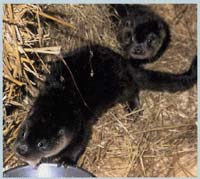Otters and Rivers Project
Operation Otter Cub: update
? There's some sad news to report • about the two orphaned otter cubs : rescued last October. They were :; moved in January from a recovery cage at Newquay Zoo to a secret wild enclosure. Unfortunately the male died shortly afterwards. We think he died due to a combination of factors including being so small, trauma, overexerting himself outdoors and appalling weather -resulting in hypothermia.
The good news is that his sister is doing very well. However, otters have to be reared with an otter companion. This means we have to move the female to an otter rescue place in Hampshire, where a similar-aged cub also needs a companion. In the wild, cubs would stay with their mother for 12 to 18
months. Otters are solitary, coming together only very briefly during mating. The first year or so within the family group is therefore very important, especially for a young female, and we hope to release this one later in the year back into the wild in Cornwall to breed.
It is a complex, time-consuming and costly operation and we have to consider: is it worth it? In Cornwall we are honoured to have good otter populations but this is a rare species that is still recovering. We think it's worth it and hope you agree.
Kate Stokes
 The
male (in front) and his shyer sister feeding in the recovery cage at Newquay
Zoo. Photo: Clive Martin
The
male (in front) and his shyer sister feeding in the recovery cage at Newquay
Zoo. Photo: Clive Martin We've been delighted with local support. A big thank you to supporters of Operation Otter Cub-so far.
• Al Appliance • Ammodytes • Cornwall Wildlife Trust • Eco-watch • Environment Agency • Pennon Water Champions (South West Water and Viridor Waste Management) • Newquay Veterinary Practice • Newquay Zoo • RSPCA • Tecker Ltd • Wildlife Veterinary Investigation Centre
A special thank you to the landowners looking after the cub enclosure. We hope to reveal them in the next issue.
Bat Group
By the time you read this, summer will be under way and bats will be out of hibernation and readily visible at twilight and around dawn. Female bats gather together in nursery roosts to gain extra warmth to speed pregnancy and the first young are born during June. Most nursery roosts of bats are in house roofs, with some species preferring hollow trees, bridges or barns.
An electronic bat detector is a useful aid to studying bats, especially after it is completely dark, but you can still watch bats at dusk while some light remains.
Noctules are the first to emerge. They are about the size of a swift and fly high; a fast, direct flight with steep dives. They have a distinctive narrow-winged silhouette which can be clearly seen
as they are against the sky. Although not a common bat, they are widespread over the county. Good places to look are near woodland and over water. Try places like Gweek, Forth Reservoir or Lanhydrock.
If you are interested in seeing bats, join the Cornwall Bat Group on one of our summer visits. Daniel Eva
Seaquest South-West
As you may have seen in the media, we have had a lot of dolphins washed onto our beaches again this year. With the help of volunteers, we have been able to send many of these for post-mortem.
We will be actively promoting the UK Turtle Code which was
launched recently. It aims to ensure that fishermen and other sea users report all turtle sightings immediately and know what to do in the event of a turtle entanglement or stranding.
Alison Forward has been very successful in taking our Seaquest for Kids initiative into schools and youth groups. If you would like
more information, or would like to help Alison, please give her a call at the Trust.
Don't forget, if you see any large marine creatures while you're out on the coast this summer, please give me a call on (01872) 240777 ext 200.
Tricia Hoskings